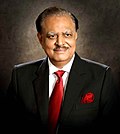Governor of Sindh
| Governor of Sindh | |
|---|---|
 Governor of Sindh's Seal | |
 Provincial Flag of Sindh | |
since 9 October 2022 | |
| Style | The Honorable (formal) |
| Residence | Governor House |
| Seat | Karachi, Sindh, Pakistan |
| Nominator | Prime Minister of Pakistan |
| Appointer | President of Pakistan |
| Term length | 5 years |
| Constituting instrument | Constitution of Pakistan |
| Formation | 15 August 1947 |
| First holder | Sir Charles Napier |
| Salary | 10000$ |
| Website | www |
The governor of Sindh is the appointed head of the province of Sindh, Pakistan. The office of the governor as the head of the province is largely a ceremonial position; the executive powers lie with the Chief Secretary and the Chief Minister of Sindh.
However, there were instances throughout the history of Pakistan, the powers of the provincial governors were vastly increased, when the provincial assemblies were dissolved and the administrative role came under direct control of the governors, as in the cases of martial laws of 1958–1972 and 1977–1985, and governor rules of 1999–2002. In the case of Sindh, there were three direct instances of governor's rule under Mian Aminuddin, Rahimuddin Khan and Moinuddin Haider respectively, in 1951–1953, 1988, and 1998 when the provincial chief ministers of those times were removed and assemblies dissolved.
The governor is appointed by the president on the advice of the prime minister. The Governor House in Karachi is the official residence of the governor of Sindh. Kamran Tessori is the current governor of Sindh.
Caliphate
[edit]The Muslim province of Sind was under the reign of Umayyad and Abbasid caliphates. The governor of Sind was an official of Umayyad and Abbasid caliphates.[1]
Mughal Empire
[edit]Following its annexation of Sindh's independent sultanates, the Mughal Empire administered southern Sindh as the Thatta Subah or Sarkar from 28 Mar. 1593 until the early 18th century. Northern Sindh was ruled separately by the Kalhora dynasty until around 1739, when Persian assistance allowed them to annex Thatta Subah as well. Following the 1783 Battle of Halani, Kalhora control was replaced by the Talpur dynasty.
British Raj
[edit]Sir Charles Napier (1843-1847) became the first ever Chief Commissioner and Governor of Sind.[2]
Pakistan
[edit]Following is the list of Sindh governors after the independence of Pakistan in 1947.
| No. | Portrait | Name of governor | Term of office | Political affiliation | ||||
|---|---|---|---|---|---|---|---|---|
| 1. | 
|
Shaikh G.H. Hidayatullah | August 15, 1947 | October 4, 1948 | 1 year, 48 days | Muslim League | ||
| 2. | 
|
Shaikh Din Muhammad | October 7, 1948 | November 19, 1949 | 1 year, 43 days | - | ||
| 3. | 
|
Mian Aminuddin | November 19, 1949 | May 1, 1953 | 3 years, 163 days | - | ||
| 4. | 
|
George Baxandall Constantine | May 2, 1953 | August 12, 1953 | 102 days | Civil Administration | ||
| 5. | 
|
Habib Ibrahim Rahimtoola | August 12, 1953 | June 23, 1954 | 315 days | Muslim League | ||
| 6. | 
|
Iftikhar Hussain Khan Mamdot | June 24, 1954 | October 14, 1955 | 1 year, 112 days | |||
| Sindh province was abolished and became part of West Pakistan unit October 14, 1955 — July 1, 1970 | ||||||||
| 7. | 
|
Lieutenant-General Rakhman Gul | July 1, 1970 | December 20, 1971 | 1 year, 172 days | Military Administration Pakistan Army |
||
| 8. | 
|
Mumtaz Bhutto | December 24, 1971 | April 20, 1972 | 118 days | Pakistan Peoples Party | ||
| 9. | 
|
Mir Rasool Bux Talpur | April 29, 1972 | February 14, 1973 | 291 days | |||
| 10. | 
|
Begum Ra'ana Liaquat Ali Khan | February 15, 1973 | February 28, 1976 | 3 years, 13 days | Independent | ||
| 11. | 
|
Muhammad Dilawar Khanji | March 1, 1976 | July 5, 1977 | 1 year, 126 days | Pakistan Peoples Party | ||
| 12. | 
|
Abdul Kadir Shaikh | July 6, 1977 | September 17, 1978 | 1 year, 73 days | Civil Administration | ||
| 13. | 
|
Lieutenant-General S.M. Abbasi |
September 18, 1978 | April 6, 1984 | 5 years, 201 days | Military Administration Pakistan Army | ||
| 14. | 
|
Lieutenant-General (retd.) Jahan Dad Khan | April 7, 1984 | January 4, 1987 | 2 years, 272 days | |||
| 15. | 
|
Ashraf W. Tabani | January 5, 1987 | June 23, 1988 | 1 year, 170 days | Independent | ||
| 16. | 
|
General (retd.) Rahimuddin Khan | June 24, 1988 | September 12, 1988 | 80 days | Military Administration Pakistan Army |
||
| 17. | 
|
Justice Qadeeruddin Ahmed | September 12, 1988 | April 18, 1989 | 218 days | Supreme Court of Pakistan | ||
| 18. | 
|
Justice Fakhruddin G. Ebrahim | April 19, 1989 | August 6, 1990 | 1 year, 109 days | |||
| 19. | 
|
Mahmoud Haroon | August 6, 1990 | July 18, 1993 | 2 years, 346 days | Independent | ||
| 20. | 
|
Hakim Saeed | July 19, 1993 | January 23, 1994 | 188 days | |||
| (19) | 
|
Mahmoud Haroon | January 23, 1994 | May 21, 1995 | 1 year, 118 days | |||
| 21. | 
|
Kamaluddin Azfar | May 22, 1995 | March 16, 1997 | 1 year, 298 days | Pakistan People's Party | ||
| 22. | 
|
Lieutenant General (retd.) Moinuddin Haider | March 17, 1997 | June 17, 1999 | 2 years, 92 days | Military Administration Pakistan Army | ||
| 23. | 
|
Mamnoon Hussain | June 19, 1999 | October 12, 1999 | 115 days | Pakistan Muslim League (N) | ||
| 24. | 
|
Air Marshal Azim Daudpota | October 25, 1999 | May 24, 2000 | 212 days | Military Administration Pakistan Air Force | ||
| 25. | 
|
Muhammad Mian Soomro | May 25, 2000 | December 26, 2002 | 2 years, 215 days | Pakistan Muslim League (Q) | ||
| 26. | 
|
Ishrat-ul-Ibad Khan | December 27, 2002 | November 9, 2016 | 13 years, 318 days | Muttahida Qaumi Movement | ||
| 27. | 
|
Chief Justice (Ret.) Saeeduzzaman Siddiqui | November 11, 2016 | January 11, 2017 | 61 days | Pakistan Muslim League (N) | ||
| 28. | 
|
Mohammad Zubair | February 8, 2017 | July 29, 2018 | 1 year, 171 days | |||
| 29. | 
|
Imran Ismail | August 27, 2018 | April 10, 2022 | 3 years, 226 days | Pakistan Tehreek-e-Insaf | ||
| - | 
|
Agha Siraj Durrani (acting) |
20 April, 2022 | October 9, 2022 | 172 days | Pakistan People's Party | ||
| 30. | 
|
Kamran Tessori | 10 October 2022 | Incumbent | 2 years, 207 days | Muttahida Qaumi Movement – Pakistan | ||
See also
[edit]- Chief Minister of Sindh
- Government of Sindh
- Provincial Assembly of Sindh
- List of governors of Pakistan
- List of chief ministers in Pakistan
- List of presidents of Pakistan
- List of commissioners and governors of Sind in British India
- Commissioner Karachi
- Mayor of Karachi
- Administrator Karachi
- Government of Karachi
References
[edit]- ^ Al-Ya'qubi, pp. 388, 557, 448, 599; al-Tabari, v. 32: p. 106
- ^ "General Charles Napier and the Conquest of Sind". www.victorianweb.org. Retrieved 27 October 2020.
- List of Governors of Sindh Archived 4 July 2016 at the Wayback Machine
